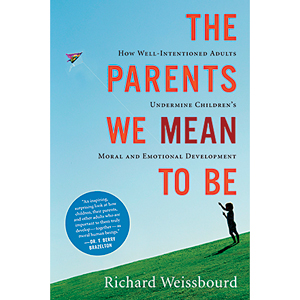
The Parents We Mean to Be
 Since I began Parenting by the Book in January of 2010, I have read 33 titles, and after a while, the advice sounds the same, but Richard Weissbourd’s The Parents We Mean to Be: How Well-Intentioned Adults Undermine Children’s Moral and Emotional Development is different, especially his take on how being close to children can backfire.
Since I began Parenting by the Book in January of 2010, I have read 33 titles, and after a while, the advice sounds the same, but Richard Weissbourd’s The Parents We Mean to Be: How Well-Intentioned Adults Undermine Children’s Moral and Emotional Development is different, especially his take on how being close to children can backfire.
“To obtain maturity, appreciation for others, and ideals, children need at certain stages of developmental to idealize their parents – that’s one powerful way in which children internalize their parents’ moral qualities …And many of us are making it hard for children to idealize us, in part because we are idealizing them.” Weissbourd explains that when parents are too eager to earn their child’s approval it prevents them from providing the high moral standards and firm discipline children need.
In cases such as these, it’s not unusual for parents and children to have difficulty separating. “Burdened by their parents’ needs, some children seek to disconnect themselves from their parents and rely too much on their peers’ standards and expectations.” Weissbourd argues parents need to recede to the edge of their children’s consciousness so that teens can form their own identities. For parents who have been idealizing their children, Weissbourd believes they end up feeling angry and hurt, wondering why their children are pulling away when they did everything “right.” To avoid making matters worse, “these wounded parents may pull back on their moral expectations.”
The Parents We Mean to Be maintains “parents who idealize their children or who want to be their children’s friends can disrupt the process of idealization in several ways. It’s clearly much harder for children to idealize us when we engage them as “equals.” As far as Weissbourd is concerned, “Children have no incentive to become like us – because the message we’re giving is that they already are – and the world can simply be frightening to children who don’t think we have more moral wisdom or authority than they do.” This makes perfect sense to me. I wouldn’t idealize someone who constantly serves me and fails to trust in my ability to take care of myself.
Weissbourd believes parents need to worry less about their children separating and make more of an effort to separate themselves. He sees camps and vacations as opportunities to not only develop their independence but ours. When we do so, the separation helps parents see the ways “our close relationships with our children might be diminishing or fraying our ties to other adults we hold dear and who might help us as parents.” This attempt to bond with our offspring is part of the reason “one major survey suggests that American parents today have fewer confidants than parents twenty years ago.” So basically parents need a life of their own.
Just as parents today might be compensating for a closeness they wish they had with their parents, Weissbourd urges parents need to anticipate the wrongs this generation’s children will attempt to right. After reading The Parents We Mean to Be, one area our children might try to change is that of achievement, which according to Weissbourd is “a public health problem, especially given the pervasive and serious moral and emotional troubles it’s creating in affluent communities.” For example, research from Columbia University indicates “suburban girls are three times more likely to report clinical levels of depression than other teens on average.”
Sociologist Arlie Hochschild explains the problem in The Parents We Mean to Be, “Parents are anxious about passing along to their children their own station in life. And they can’t do it through land or money in a meritocracy. You do it through your kid’s skills.” Therefore, in my next post, I’ll explore healthy achievement and the morally mature sports parent, but unfortunately, I may not get to Weissbourd’s thoughts on the real moral power of schools. The long of the short of it – I highly recommend this book for your shelf.
Like Parenting by the Book on Facebook or follow @WinterhalterV on Twitter for updates on blog posts.
Read my other blog Befriending Forty.






